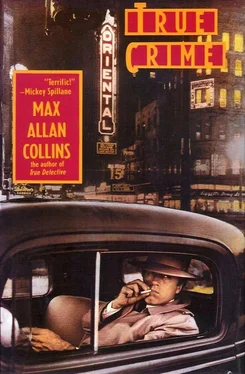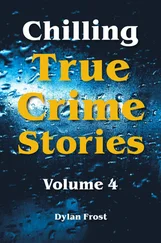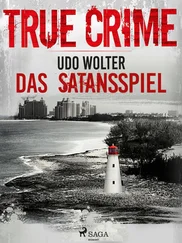As I turned the pages, she was looking down at them with a fond, nostalgic little smile.
“Candy made his mark,” she said. “They can’t take that away from him. Or me.”
She closed the book, and closed the suitcase.
“Excuse me.” It was Karpis, peeking in.
“Change of plans,” he said. “You’re going to drive Ma. She says the Auburn’s hers, and you’re her driver, and that’s that. No use arguing with Ma.”
He smiled that smile and was gone.
“No use arguing with Ma,” Louise said, smiling a little herself, but meaning it.
“I guess I’ll see you later,” I said. “At the tourist camp.”
She put her arms around me and gave me a kiss. A long romance-magazine kiss.
And then I left.
Because there was no use arguing with Ma.
So Ma and I went back on the road, back pretty much the way we came — down Highway 19, turning onto 22, heading south toward Aurora. Ma couldn’t find any hillbilly music on the radio, but she did discover a fresh batch of Burma Shave signs along the way, and read them to me, haw-hawing. In between she’d hum her hymns.
I didn’t mind Ma. I was used to her. I wished she was Louise, so I could get the hell out of this, but I was used to her. I was getting used to this highway driving, too; passing slower moving traffic — the occasional slowpoke in a Model T, the farmer hauling a hayrack — with some confidence, now. The Auburn could overtake another vehicle with relative ease, despite these narrow two-lane highways.
Like Ma said: “Keep well to the right... of the oncoming car... get your close shaves... from the half-pound jar! Haw haw.”
Burma Shave.
It was late morning when we reached the tourist camp, several miles north of Aurora on a curve of the highway outlined by whitewashed stones that parted midway like the Red Sea; there a gravel drive led in to a court where against a backdrop of lush trees half-a-dozen two-room white frame cabins were arranged in a gentle arc, with a larger cottage in the middle. As you pulled in the drive, a neon sign, burning pointlessly in the sun, said FOX VALLEY COURTS, and NO VACANCY. In case you couldn’t make out that the sign was lit, a card in the window of the central, larger cabin repeated the NO VACANCY message in bold black letters. A lanky man in his forties in a Panama hat and a white shirt with sweat circles and tan baggy pants sat on a bench, one knee pointing north, the other pointing south; he was weathered and tan and licking an ice-cream cone.
I got out of the Auburn, leaving it running, and went over to him.
“No vacancy,” he said, looking at the cone, not at me.
“We got a reservation,” I said.
Now he looked at me. “Name?”
I glanced over at Ma. She leaned out the window and said, “Hunter.”
The man nodded; the cone dripped onto his lap. He didn’t care.
“Little woman’ll fix you up,” he said, and pointed behind him with a thumb to a screen door. I went in, and there was a check-in counter and a dreary little reception area — the only color in this narrow outer room was provided by a rack of postcards on the counter — but no little woman. There was a metal bell, however, which I dinged.
The little woman came through an archway behind the counter, to the left of the wall where a dozen room keys hung. The little woman weighed about 210 and stood five nine. She could’ve put Baby Face Nelson in her back pocket and sat on him — of course his tommy gun might’ve goosed her some. She had a blue-and-white floral house-dress on, very cheery, but she looked as depressed as the economy.
“I never seen you before,” she said, looking at me wearily, warily. She was in her thirties, I’d wager, but most people would’ve said forties — her hair in a graying bun that seemed about to unravel, several chins stacked on each other. A pretty face was buried in there somewhere. Green alert eyes.
“We never met, ma’am.”
“But you’re one of them.” Accusingly.
“I guess I am.”
Heavy sigh. “How many cabins you need?”
“Two.”
She got a pair of keys off the board behind her. Handed them to me. Looked at me slow and hard.
“Stay away from my Eddie and Clarice.”
“Pardon?”
“I got two young ones — Eddie seven, Clarice eight. They already think your friend Nelson’s the cat’s meow. I don’t want ’em shining up to any more of your kind.”
Even though I wasn’t an outlaw, really, I resented her attitude. “Our money’s good enough for you,” I pointed out.
“That’s my husband’s doing. If he hadn’t done time, he wouldn’t be so partial to you people.” She shook her head side to side; her lower lip trembled — like she was angry, or about to cry, or both. “You’ll be the death of him yet.”
Or maybe he’d just do some more time. He had to be a greedy type, her ice-cream-cone licker out on the bench; there were plenty of tourists, this time of year, to fill a tourist camp like this, in the heart of the Fox River valley. But they’d pay perhaps a buck and a half for a room for a night. The tourists about to descend on Fox Valley Courts would be paying twenty times that.
I drove Ma down to her cabin. Each white frame structure was divided into two numbered rooms. The half a cabin I’d be sharing with Louise was down a few doors. I began carrying Ma’s things in for her; she immediately stretched out on one of the twin beds and began to read a Photoplay magazine with Claudette Colbert on the cover. It took me two trips to cart her stuff in, by which time she was asleep, snoring, the magazine folded over her generous bosom, Claudette’s smiling face rising and falling.
I decided to have a nap myself. In my own room. There were twin beds here, too, several feet apart, and I hoped to keep it that way tonight. Your client’s daughter , I reminded myself. The stiffening in my trousers at just the thought of her, however, indicated my client’s best interests were probably not going to be served, in this little puce-papered room.
First order of business was to use the indoor plumbing each room seemed to have. As I stood there emptying my bladder I reflected on how nice it felt to be back in the twentieth century — even if there was a bug the size of your thumb in the bathtub at my right. I didn’t bother to kill it. Live and let live. Took off my pants and took my nap.
A knocking at the door awoke me. I checked my watch and it was a little before two o’clock. I took the automatic out from under my pillow and went to the open window, where sheer curtains fluttered in a slight summer breeze. I peered out through them.
A big man — barrel-chested, six foot two, ruddy, round-faced, dark-haired, early thirties — was standing there in his shirt sleeves and suspenders. The butt of a .45 peeked out of his waistband.
It took me a few seconds, but then I realized who it was. I’d seen his picture in the papers often enough.
Charles Arthur Floyd.
Pretty Boy.
He knocked again. “Lawrence? Jimmy Lawrence?”
I cracked the door, gun in hand out of view. “That’s right,” I said. Doing my best to keep recognition out of my voice and face. “Who wants to know?”
“My name’s Charlie Floyd,” he said, and smiled. He had a small, cupid mouth, but a big smile, because when he smiled, his whole round face lit up. Like Polly Hamilton, he had apple cheeks. “I been hearin’ some good things ’bout you from mutual acquaintances.”
“Such as?”
His smile continued, but some strain was starting to show. “Nelson, Karpis, so on. Open up. Let me in. You can see both my hands and my gun. You surely got a gun on me, so what’s the worry?”
I stood back, eased the door open, held the gun on him.
Читать дальше












